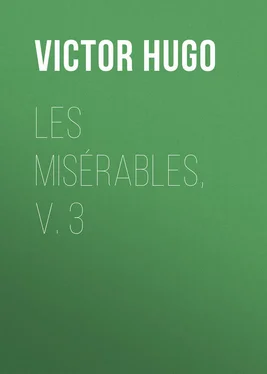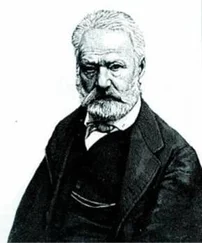Victor Hugo - Les Misérables, v. 3
Здесь есть возможность читать онлайн «Victor Hugo - Les Misérables, v. 3» — ознакомительный отрывок электронной книги совершенно бесплатно, а после прочтения отрывка купить полную версию. В некоторых случаях можно слушать аудио, скачать через торрент в формате fb2 и присутствует краткое содержание. Жанр: literature_19, foreign_antique, foreign_prose, на английском языке. Описание произведения, (предисловие) а так же отзывы посетителей доступны на портале библиотеки ЛибКат.
- Название:Les Misérables, v. 3
- Автор:
- Жанр:
- Год:неизвестен
- ISBN:нет данных
- Рейтинг книги:4 / 5. Голосов: 1
-
Избранное:Добавить в избранное
- Отзывы:
-
Ваша оценка:
- 80
- 1
- 2
- 3
- 4
- 5
Les Misérables, v. 3: краткое содержание, описание и аннотация
Предлагаем к чтению аннотацию, описание, краткое содержание или предисловие (зависит от того, что написал сам автор книги «Les Misérables, v. 3»). Если вы не нашли необходимую информацию о книге — напишите в комментариях, мы постараемся отыскать её.
Les Misérables, v. 3 — читать онлайн ознакомительный отрывок
Ниже представлен текст книги, разбитый по страницам. Система сохранения места последней прочитанной страницы, позволяет с удобством читать онлайн бесплатно книгу «Les Misérables, v. 3», без необходимости каждый раз заново искать на чём Вы остановились. Поставьте закладку, и сможете в любой момент перейти на страницу, на которой закончили чтение.
Интервал:
Закладка:
Seek for anything which Paris has not. The tub of Trophonius contains nothing which is not in Mesmer's trough; Ergaphilas is resuscitated in Cagliostro; the Brahmin Vasaphanta is incarcerated in the Count de St. Germain; and the cemetery of Saint Médard performs quite as good miracles as the Oumoumie Mosque at Damascus. Paris has an Æsop in Mayeux, and a Canidia in Mademoiselle Lenormand; it is startled as Delphi was by the flaming realities of the vision; it makes tables turn as Dodona did tripods; it places a grisette upon a throne as Rome placed a courtesan; and, after all, if Louis XV. is worse than Claudius, Madame Dubarry is better than Messalina. Paris combines in an extraordinary type what has lived and what we have elbowed, – Greek nudity, the Hebrew ulcer, and Gascon puns. It mixes up Diogenes, Job, and Paillasse, dresses a ghost in old numbers of the Constitutionnel, and makes Chodrucnito a Duclos. Although Plutarch says that "the tyrant never goes to sleep," Rome, under Sylla as under Domitian, was resigned, and liked to mix water with its wine. The Tiber was a Lethe, if we may believe the somewhat doctrinaire eulogium which Varus Vibiscus made of it: Contra Gracchos Tiberim habemus. Bibere Tiberim, id est seditionem oblivisci . Paris drinks a million quarts of water a day; but that does not prevent it from beating the tattoo and ringing the alarm-bell when the opportunity offers.
With this exception, Paris is good-natured. It accepts everything royally; it is not difficult in the matter of its Venus; its Callipyge is a Hottentot; provided that it laughs, it forgives; ugliness amuses it, deformity does it good, and vice distracts it; if you are droll you may be a scoundrel; even hypocrisy, that supreme cynicism, does not revolt it; it is so literary that it does not hold its nose on passing Basile, and is no more scandalized by Tartuffe's prayer than Horace was terrified by the "hiccough" of Priapus. No feature of the human face is wanting in the profile of Paris; the Mabille ball is not the Polyhymnian dance of the Janiculum, but the wardrobe-dealer has her eyes fixed on the Lorette there, exactly as the procuress Staphyla watched the Virgin Planesium. The Barrière des Combats is not a Coliseum, but people are as ferocious there as if Cæsar were looking on. The Syrian hostess has more grace than Mother Saguet; but if Virgil frequented the Roman wine-shop, David of Angers, Balzac, and Charlet have seated themselves in Parisian pot-houses. Paris reigns, geniuses flash in it, and red-tails prosper. Adonaïs passes through it in his twelve-wheeled car of thunder and lightning, and Silenus makes his entrance on his barrel. For Silenus read Ramponneau.
Paris is the synonym of Cosmos; Paris is Athens, Rome, Sybaris, Jerusalem, and Pantin. All civilizations are found there abridged, but so are all barbarisms. Paris would be very sorry not to have a guillotine; a little of the Place de Grève is useful, for what would this eternal festival be without that seasoning? The laws have wisely provided for that, and, thanks to them, the knife drains drops of blood upon this Mardi-Gras.
CHAPTER XI
THE REIGN OF RIDICULE
There are no limits to Paris; and no other city has held this sway, which at times derides those whom it holds in subjection. "To please you, O Athenians!" Alexander exclaimed. Paris makes more than the law, for it sets the fashion; and it makes more than fashion, for it produces routine. Paris may be stupid, if it think proper; at times it indulges in that luxury, and then the universe is stupid with it; but Paris soon wakes up, rubs its eyes, says, "How stupid I am!" and laughs in the face of the human race. What a marvel such a city is! How strange it is to find this grandeur and this buffoonery side by side; to see how all this majesty is not deranged by this parody, and the same mouth to-day blowing the trumpet of the last judgment, and to-morrow a penny whistle! Paris has a sovereign gayety; but the gayety is lightning, and its farce holds a sceptre. Its hurricane at times issues from a furnace; its explosions, its days, its masterpieces, its prodigies, its epics, go to the end of the world, and so do its cock-and-bull tales. Its laugh is the crater of a volcano which bespatters the world, and its jokes are sparks of fire. It imposes upon nations its caricatures as well as its ideal, and the loftiest monuments of human civilization accept its ironies and lend their eternity to its jokes. It is superb; it has a prodigious July 14, which delivers the globe; its night of August 4 dissolves in three hours a thousand years of feudalism; it makes with its logic the muscle of the unanimous will; it multiplies itself in every form of sublimity; it fills with its lustre Washington, Kosciusko, Bolivar, Bozzaris, Riégo, Bem, Manin, Lopez, John Brown, and Garibaldi. It is found wherever the future bursts into a flash, – at Boston in 1779, at the Isle of Leon in 1820, at Pesth in 1848, at Palermo in 1860; it whispers the powerful watchword "Liberty" in the ear of the American abolitionists assembled at Harper's Ferry, and in that of the patriots of Ancona assembled in the darkness before the Gozzi inn, on the sea-shore; it creates Canaris, it creates Quiroga, it creates Pisacane, it radiates grandeur upon the earth; it was by going whither its blast impelled him that Byron died at Missolonghi, and Mazet at Barcelona; it is a tribune under the feet of Mirabeau, and a crater under those of Robespierre; its books, plays, art, science, literature, and philosophy are the manuals of the human race; it has Pascal, Regnier, Corneille, Descartes, and Jean Jacques; Voltaire for any moment, Molière for all ages; it makes the universal mouth speak its language; it constructs in every mind the idea of progress; the liberating dogmas which it fuses are well-tried friends for generations, and it is with the mind of its thinkers and its poets that all the heroes of all nations have been formed since 1789. Still, this does not prevent it from playing the gamin; and the enormous genius which is called Paris, while transfiguring the world with its light, draws Bouginier's nose with charcoal on the wail of the Temple of Theseus, and writes Crédeville Voleur upon the Pyramids.
Paris constantly shows its teeth, and when it is not scolding it is laughing; such is Paris. The smoke from its chimneys constitutes the ideas of the universe; it is a pile of mud and stones if you like, but it is, before all, a moral being. It is more than grand, it is immense; and why? Because it dares. Daring is the price paid for progress. All sublime contests are more or less the rewards of boldness. For the Revolution to take place, it was not enough that Montesquieu should foresee it, Diderot preach it, Beaumarchais announce it, Condorcet calculate it, Arouet prepare it, and Rousseau premeditate it, – it was necessary that Danton should dare it.
The cry "Audace!" is a Fiat lux . In order that the human race may progress, it must have proved lessons of courage permanently before it. Rashness dazzles history, and is one of the great brightnesses of man. The dawn dares when it breaks. To attempt, to brave, persist, and persevere, to be faithful to one's self, to wrestle with destiny, to astound the catastrophe by the slight fear which it causes us, at one moment to confront unjust power, at another to insult intoxicated victory, to hold firm and withstand, – such is the example which people need and which electrifies them. The same formidable flash goes from the torch of Prometheus to the short clay pipe of Cambronne.
CHAPTER XII
THE FUTURE LATENT IN THE PEOPLE
As for the Parisian people, even when full grown, it is always the gamin. Depicting the lad is depicting the city, and that is the reason why we have studied the eagle in the sparrow.
Читать дальшеИнтервал:
Закладка:
Похожие книги на «Les Misérables, v. 3»
Представляем Вашему вниманию похожие книги на «Les Misérables, v. 3» списком для выбора. Мы отобрали схожую по названию и смыслу литературу в надежде предоставить читателям больше вариантов отыскать новые, интересные, ещё непрочитанные произведения.
Обсуждение, отзывы о книге «Les Misérables, v. 3» и просто собственные мнения читателей. Оставьте ваши комментарии, напишите, что Вы думаете о произведении, его смысле или главных героях. Укажите что конкретно понравилось, а что нет, и почему Вы так считаете.












